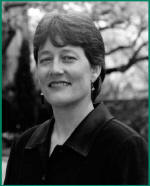 |
 |
Advertise | Sustaining Membership | VAN Store | Feedback
by Christopher Caines for Vocal Area Network
Posted May 9, 2009
 Kristina Boerger ends her nine-year tenure as conductor and artistic director
of New York City's Cerdorrion Vocal Ensemble with the chorus's last concerts of
the season: May 10 at 4 PM at the Village Light Opera Dewar Center, 65 Leonard
Street; and May 17 at 4 PM at the Church of Saint Ignatius of Antioch, 87th
Street and West End Avenue. The program features several new pieces composed for
Cerddorion by Robert Dennis, Julie Dolphin, Cerddorion tenor Eddie Rubeiz,
Yumiko Matsuoka and Kristina, as well the premiere of a piece by David Noon.
Starting next fall Kristina takes up a new post, as Director of Choral
Activities at Carroll University, just west of Milwaukee, Wisconsin. Kristina
was interviewed recently by choreographer Christopher Caines, director of the
Christopher Caines Dance Company, who sits on Cerddorion's board and has
collaborated with Kristina and the choir on several projects.
Kristina Boerger ends her nine-year tenure as conductor and artistic director
of New York City's Cerdorrion Vocal Ensemble with the chorus's last concerts of
the season: May 10 at 4 PM at the Village Light Opera Dewar Center, 65 Leonard
Street; and May 17 at 4 PM at the Church of Saint Ignatius of Antioch, 87th
Street and West End Avenue. The program features several new pieces composed for
Cerddorion by Robert Dennis, Julie Dolphin, Cerddorion tenor Eddie Rubeiz,
Yumiko Matsuoka and Kristina, as well the premiere of a piece by David Noon.
Starting next fall Kristina takes up a new post, as Director of Choral
Activities at Carroll University, just west of Milwaukee, Wisconsin. Kristina
was interviewed recently by choreographer Christopher Caines, director of the
Christopher Caines Dance Company, who sits on Cerddorion's board and has
collaborated with Kristina and the choir on several projects.
Christopher Caines: Kristina, rather unexpectedly for all of us, it turns out that Cerddorion's upcoming concerts will be your last with the chorus. Tell me about the program. How did you conceive it and put it together, and what are the musical highlights for you?
Kristina Boerger: My conception for this program began with the cantata Stone Soup that Julie Dolphin has recently composed for us. The piece--scored for piano, cello, clarinet, mixed chorus, and SATB soloists--is a retelling of a beloved children's tale about soldiers returning from war. For the last three years, we have also been holding a three-movement work that Robert Dennis composed for us in a season when we did not have a suitable programming niche for it. Putting the Dennis and the Dolphin works together now gave me an opportunity to build a concert of premieres. It also happened nicely that this season marked the arrival on my desk of a new arrangement by a cappella jazz-pop genius Yumiko Matsuoka, several of whose pieces we have sung in past seasons. In fact, last year the women of Cerddorion recorded her Skye Boat Song for an anthology of her works, and the agreement was that in exchange, she would create a new piece for Cerddorion. So we will feature Souvenirs, her treatment of a gorgeous ballad by the late Dan Fogelberg. Then I decided to take the opportunity of a concert of premieres to finish composing the last of my Three Widow Poems, a trilogy on poetry by Sarah White. The first two settings have been performed in Illinois and in New York, but now the set is complete and will be presented in its entirety. These pieces of mine are for women's voices, and so I asked Cerddorion tenor Eddie Rubeiz, who has composed beautifully for us in the past, to write something for the men of Cerddorion. He responded with a piece called Lullaby. By sheer serendipity, composer David Noon recently handed me a set of Apollinaire settings that had not yet been performed, so we are proud to be premiering his Un petit bestiaire on our program. But to open the concert, we begin with something old, a humorous part-song by William Billings called Modern Musick, which pokes fun at the serious business of concert premieres!
The musical highlights offered me by these pieces are many, but I can identify some delights that are particular to this program. In Julie's cantata, we get to work with three stellar instrumentalists, which is rare in Cerddorion's mostly a cappella repertoire. Yumiko's piece is deeply pleasurable for me simply because she chose one of my very favorite songs to arrange; furthermore, this performance of Souvenirs will feature Eddie Rubeiz as soloist, whose singing is always so full of love. I'm particularly excited to hear my friends and outstanding colleagues Michèle Eaton and Silvie Jensen, who will be guest soprano soloists performing in my pieces. Also featured in my set will be the trombone artistry of Julie Josephson, a tremendously creative artist. Bob Dennis's music is always so richly and imaginatively textured; it has been a delight for me to hear his design take shape in the room. I imagine that the thrill I get from successfully conducting one of his pieces is akin to what video-game aficionados feel when they manage to negotiate their virtual cars around all the sudden obstacles. In David's set there is a moment when the chorus has to simulate the sound of buzzing insects, and I'm actually looking forward to that moment when we can all take ourselves a bit less seriously than usual. And in Eddie's piece, I get to whistle a duet. (I am a constant and passionate whistler and have always thought that my whistling deserved a public forum. So here it is at last!) Finally, I'm looking forward to enjoying the work of Nathaniel LaNasa, who has been my conducting apprentice this year. He'll be conducting two pieces on this program, which will give me the opportunity to sit back and just enjoy what's happening on stage.
CC: That all sounds so exciting! You'll be exiting on a high note, that's for sure. Now, you've led Cerddorion for almost a decade. Tell me, looking back, what stands out for you? What have been your peak artistic experiences with the group, the memories you'll most cherish? And how do you think about your legacy with the chorus--what do you most want them to maintain and pursue and deepen, of all the aspects of choral singing that you've worked to develop during your tenure?
KB: There have been many peak artistic moments for me. In fact, the opportunity to perform Aulis Sallinen's wonderful Lauluja Mereltä at the Merce Cunningham Studios while your company danced your choreography was deeply satisfying for me, and I think it was exciting for the singers. Our successful performances of Copland's In the Beginning and Bach's Lobet den Herrn stand out as triumphs for all of us; our work on these challenging, magnificent works had to be prepared very carefully to bring the results that we ultimately enjoyed. Our collaboration on the Pizzetti Requiem with about 30 invited singers gave us the opportunity to do something in a more lush texture than we can achieve with 28 voices, and it enlarged our singing community for a period of weeks leading up to a beautiful culmination. But I am most proud of our commissions for our tenth anniversary. With Un prodigio les canto, Elliot Z. Levine gave us a masterfully expressive and intriguing four-movement setting of poetry by Sor Juana that quickly went on to receive performances at Yale and Cornell. David Lang's again has received performances in Sweden and Ireland and has just been released on a Harmonia Mundi recording under the direction of Paul Hillier. Finally, Lisa Bielawa's Lamentations for a City has given me as much deep satisfaction as any work, and recording it for the CD A Handful of World on the Tzadik label must be one of the worthiest contributions I've had the privilege of making to the choral art.
My legacy? I have wished to leave every singer with an appreciation of the tremendous disciplinary demands that the choral art makes on us and to motivate every singer to increase or at least maintain her or his skills--of vocal technique, of score analysis and absorption, of stylistic interpretation, of cooperating in sound and time and spirit with the other members of an ensemble. I have also hoped to encourage an openness to a wide variety of styles, including the new and unfamiliar, as well as the folk-derived.
CC: So we've talked about what you'll leave behind. What about what you'll take with you? I know that we both feel that we learn a great deal from everyone we teach or direct, and from all of our colleagues. In New York you've conducted Cerddorion, Amuse, the Collegiate Chorale, and pickup choirs, sung with the Western Wind and Pomerium and many project groups, and then there's all your teaching at Barnard and the Manhattan School. At Carroll University next year, you'll be responsible for directing several vocal ensembles. What would you say are the most important things you've learned through all your work as part of the New York musical community? What will you take with you from your time here to all your lucky students in Wisconsin?
KB: One word heads the list of what I will bring: REPERTOIRE! Working like a maniac these nine years has brought me through piles and piles of music that will feed my endeavors for a long time to come. The Western Wind has been the greatest contributor here, as their stylistic palette ranges beyond that of any other group I know. Through Pomerium, with Alex Blachly, I acquired a new set of ears, having learned to work with principles of “just” intonation--rather than equal temperament--when appropriate. That will influence the a cappella work I do with my choirs--which at Carroll, incidentally, will take place in a wonderfully reverberant acoustic perfectly suited to natural tunings. Through years of singing with colleagues who are better singers than I am, I have learned some foundational principles of vocal technique--and some effective pedagogical practices--that I hope will set my young singers in the direction of a long adulthood of singing enjoyment and success. I have seen what happens in the second half of life to people who never had their basic vocal faults corrected: their desire to sing outpaces their actual ability to produce the sounds needed, a gap that only widens. Of course, our bodies will age, deteriorate, and disappear--there is no good way of preventing that altogether. But as singers like the 67-year-old Placido Domingo prove, the voice that is properly used is more successful in resisting entropy. Next year I will be working with singers who are of an age to have bad habits eradicated and good ones inculcated, and it will be one of my most serious responsibilities to figure out how to do that for them.
CC: Thank you, Kristina. You've opened my ears to a lot of music I never even knew existed. I hope we'll see--and hear--you in New York some times, despite your new responsibilities. We'll miss you!
KB: Good heavens; I can't even begin to ponder how much I will miss my musical families here! If I think about that, I won't be able to follow through on what I know are the right plans for this next stage in my life. No one hopes for my repeated visits to New York as much as I do! But meanwhile, I'd like to point out to any friends here who might need a break from Gotham City that Milwaukee is a pretty great place…
Christopher Caines directs the Christopher Caines Dance Company and is a member of Cerddorion's board.